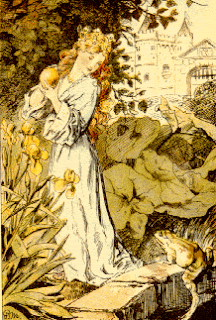Entry #6
 Love is truly a powerful force, and has been known throughout time to break even the strongest of spells. One commonly known being in the Grimm fairy tale of The Frog Prince or the Iron Heinrich. A story that tells of a young Princess who loses her precious golden ball, and a frog in a well retrieves it for her in return for many favors. The Princess struggles with her disgust for the amphibian and eventually is overwhelmed by her frustration, throwing the frog at the wall, turning him back into his prince form and they fall in love. Though, even further back in history is a story that bears some similarities to the German fairy tale. The old Greek tale of Cupid and Psyche follows the story of a beautiful young woman who is despised by the Goddess Venus due to the affection and attention she receives in reaction to her beauty. Psyche then is then sent to a prophet who says she is destined to marry a non-mortal monster. She eventually discovers that her immortal lover is in fact Cupid, and she is troubled by her struggle with curiosity, which leads to many obstacles on her path to love.
Love is truly a powerful force, and has been known throughout time to break even the strongest of spells. One commonly known being in the Grimm fairy tale of The Frog Prince or the Iron Heinrich. A story that tells of a young Princess who loses her precious golden ball, and a frog in a well retrieves it for her in return for many favors. The Princess struggles with her disgust for the amphibian and eventually is overwhelmed by her frustration, throwing the frog at the wall, turning him back into his prince form and they fall in love. Though, even further back in history is a story that bears some similarities to the German fairy tale. The old Greek tale of Cupid and Psyche follows the story of a beautiful young woman who is despised by the Goddess Venus due to the affection and attention she receives in reaction to her beauty. Psyche then is then sent to a prophet who says she is destined to marry a non-mortal monster. She eventually discovers that her immortal lover is in fact Cupid, and she is troubled by her struggle with curiosity, which leads to many obstacles on her path to love.When analyzing the two tales, the biggest comparison I noticed between the two tales is the aspect of disguise amongst the two lovers. In the Frog Prince, the Prince is under a spell that masks him in the cloak of a measly frog, whereas in Cupid and Psyche, Cupid refuses to reveal his face to Psyche and hides his identity amongst the shadows. This causes both female characters to feel a negative emotion, the Princess feels disgust at the slimy frog and Psyche experiences distrust for her mystery lover. Both of these circumstances causes the climaxes of each story, leading toward the reveal of both Cupid and the Prince's true identities. This leads to the ladies realizing their true love for the men and eventually a happy and pleasant ending. Psyche and Cupid return to each other and have a child, Pleasure, whereas the Prince and the Princess leave to return to the Prince's land to marry and rule his kingdom.
 There are many comparisons between both tales, but the disguise that cloaks the male protagonists of each story is crucial the plot line, and most commonly remembered among readers. The famous Frog Prince that appears on the screens of children across the world, as Disney's Naveen, was once truly a measly frog waiting in a well for a golden ball to fall in.
There are many comparisons between both tales, but the disguise that cloaks the male protagonists of each story is crucial the plot line, and most commonly remembered among readers. The famous Frog Prince that appears on the screens of children across the world, as Disney's Naveen, was once truly a measly frog waiting in a well for a golden ball to fall in.

Comments
Post a Comment